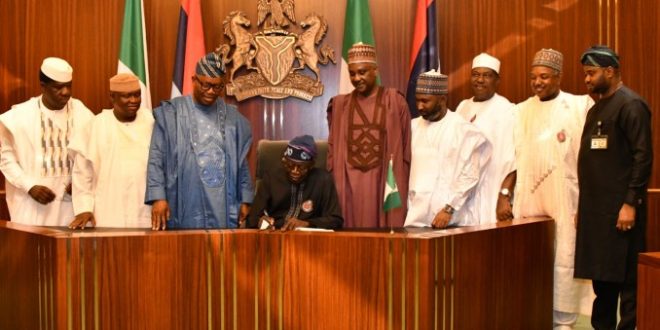President Bola Tinubu (middle) signing the 2023 supplementary Budget at the Presidential Villa in Abuja on Wednesday.With him are: From left: Senate Leader, Sen Opeyemi Bamidele; Chairman Senate Committee on Finance, Sen Olamilakan Adeola; President of the Senate, Godswill Akpabio; Speaker, House of Representatives, Tajudeen Abbas; Chairman, Secretary to the Government of the Federation, George Akume; Minister of Budget, Atiku Bagudu and Chairman, Federal Inland Revenue Services Zachs Adedeji
The federal government is looking to generate N298.4 billion in revenue from selling off and concessioning of some certain government assets to fund the 2024 budget.
The item listed as “Financing Item” was in the sectoral allocation details released by the Chairman, Senate Committee on Appropriations, Solomon Adeola.
According to a list compiled by the Bureau of Public Enterprises, some of the national assets slated for outright sales or concession include the Tafawa Balewa Square in Lagos as well as all the National Integrated Power Projects in Olorunsogo, Calabar II, Benin (located at Ihorbor), Omotosho II and Geregu II plants among many others.
The government is also planning to sell or concession all the hydro power plants across the country, including Oyan, Lower Usuma, Katsina-Ala and Giri plants.
Some of them, it was gathered, will be offered to investors for equity while others will be totally sold to reduce waste.
The Federal Government has mulled the sale of assets since 2016 but several issues such as vested interests, legal issues, political interference, protests and an inability to ascertain its proper value have halted the ambition.
The 2024 budget proposal of N27.5 trillion was presented to the National Assembly by President Bola Tinubu last Wednesday.
The budget christened “Budget of Renewed Hope” contains national revenue estimated at N18.32 trillion with a deficit of N9.18 trillion.
While presenting the budget on Wednesday, the President noted that the purpose of the bill is to ensure macroeconomic stability, increase revenue, reduce deficit as well and increase capital expenditure and allocation to reflect the key priority areas of his administration.
Tinubu also emphasized that his administration would promote a public-private partnership model to drive economic stability. He added that his administration would make provisions to leverage private capital for big-ticket infrastructure projects in energy, transportation and other sectors. A move he claimed is critical to diversify the economy as well as drive infrastructural projects in the country.
He said, “In preparing the 2024 Budget, our primary objective has been to sustain our robust foundation for sustainable economic development. A critical focus of this budget and the medium-term expenditure framework is Nigeria’s commitment to a greener future.
“This marks a critical step towards diversifying our energy mix, enhancing efficiency, and fostering the development of renewable energy sources. By allocating resources to support innovative and environmentally conscious initiatives, we aim to position Nigeria as a regional leader in the global movement towards clean and sustainable energy.”
In addition, Minister of Finance and Co-ordinating Minister of the Economy, Wale Edun, speaking on the budget, said the privatization effort will drive macroeconomic growth as well as allow investors to participate optimally in the economy.
“There is privatization in the budget. That is the direction of travel to create a stable macro-economic environment in which investors can come in and the government is yielding grounds to them and allowing them to come in and invest and provide goods and services to Nigerians.”
The budget deficit is projected at 9.18 trillion naira in 2024 or 3.88 percent of GDP. This is lower than the N13.78 trillion deficit recorded in 2023, which represented 6.11 per cent of GDP.
The deficit will be financed by new borrowings totalling N7.83 trillion, N298.49 billion from privatization proceeds, and 1.05 trillion naira drawn down on multilateral and bilateral loans secured for specific development projects.
(Blueprint)
 National Telescope national telescope newspaper
National Telescope national telescope newspaper



